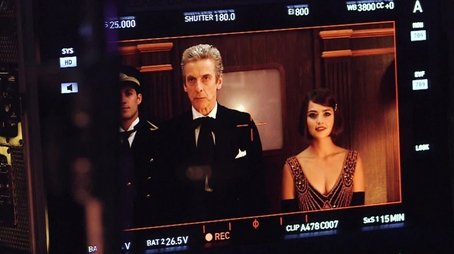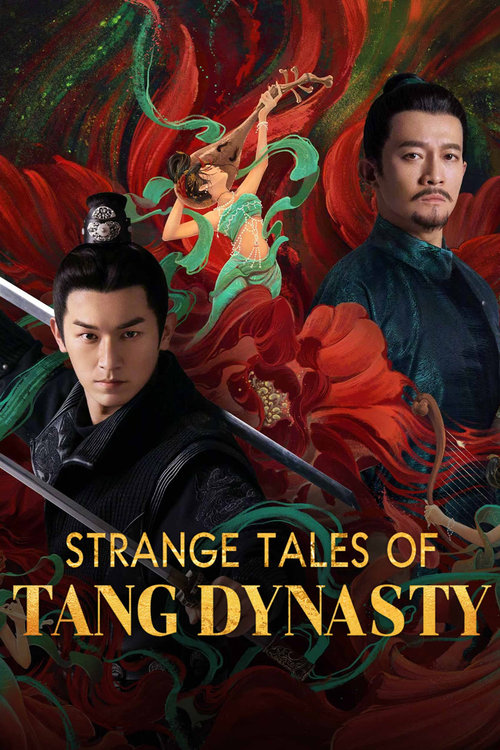
Ask Your Own Question
What is the plot?
The episode begins with the Doctor, portrayed by Peter Capaldi, and his companion Clara Oswald, played by Jenna Coleman, arriving on the luxurious space train known as the Orient Express in the year 2380. The train is a stunning sight, adorned with Art Deco designs and filled with elegantly dressed passengers. The atmosphere is festive, with a sense of excitement in the air as the train prepares to embark on its journey through space.
As the train departs, the Doctor is intrigued by the peculiar nature of the journey. He soon learns that a mysterious creature is stalking the train, and passengers have been dying under strange circumstances. The Doctor's curiosity is piqued, and he decides to investigate the situation further. Clara, initially hesitant, is drawn into the adventure, eager to support the Doctor.
The first major plot point occurs when the Doctor and Clara witness the first victim, a passenger named Professor Moorhouse, who is killed by a mummy-like creature that appears only to the victim. The Doctor realizes that the creature is a manifestation of a curse, and he begins to piece together the clues surrounding the deaths. He discovers that the creature is known as the Foretold, a being that can only be seen by those who are about to die.
As the Doctor investigates, he interacts with various passengers, including the train's conductor, who is trying to maintain order amidst the chaos. The Doctor's demeanor shifts from playful to serious as he grapples with the implications of the creature's existence. He is determined to save the remaining passengers, but he also feels the weight of the responsibility on his shoulders.
The tension escalates when the Doctor realizes that the Foretold is targeting specific individuals based on a countdown. He devises a plan to confront the creature, using technology and his wits to outsmart it. Clara, meanwhile, grapples with her own fears and doubts about the Doctor's methods, questioning whether he is becoming too detached from the human cost of their adventures.
In a pivotal moment, the Doctor sets up a trap for the Foretold, using a holographic projection to lure it into a controlled environment. The plan initially seems to work, but the creature proves to be more cunning than anticipated. The Doctor and Clara engage in a tense standoff with the Foretold, and the Doctor's quick thinking allows them to gain the upper hand.
As the confrontation unfolds, Clara's emotional state becomes increasingly fraught. She is torn between her loyalty to the Doctor and her growing concern for the lives of the other passengers. The Doctor, sensing Clara's distress, tries to reassure her, but his focus on the mission creates a rift between them.
The climax of the episode occurs when the Doctor finally confronts the Foretold directly. He learns that the creature is bound by a set of rules, and he uses this knowledge to negotiate with it. The Doctor's cleverness shines through as he manages to outwit the creature, revealing its true nature and the reason behind its actions.
In the aftermath of the confrontation, the Doctor and Clara reflect on the events that transpired. Clara expresses her frustration with the Doctor's detachment and the moral implications of their adventures. The emotional tension between them reaches a breaking point, leading to a heartfelt discussion about their relationship and the choices they make as they travel through time and space.
The episode concludes with the Doctor and Clara leaving the Orient Express, their bond tested but ultimately strengthened by the experience. The train continues its journey through the stars, a symbol of the adventures that await them, while the Doctor contemplates the nature of life, death, and the responsibilities that come with being a Time Lord.
What is the ending?
In the ending of "Doctor Who Extra: Mummy on the Orient Express," the Doctor successfully confronts the Mummy, using the knowledge he gained throughout the episode to defeat it. Clara, having faced her fears and made a significant decision about her relationship with the Doctor, chooses to leave the TARDIS. The episode concludes with the Doctor reflecting on his experiences, while Clara steps away, marking a poignant moment of change in their dynamic.
As the episode nears its conclusion, the tension aboard the Orient Express escalates. The Doctor, portrayed by Peter Capaldi, stands resolute in the dining car, having gathered the remaining passengers and crew. The Mummy, a terrifying creature that kills its victims in a countdown of 66 seconds, looms as a threat. The Doctor, with his characteristic blend of intelligence and bravado, devises a plan to confront the creature. He understands that the Mummy is bound by a set of rules, and he intends to exploit these to save the remaining passengers.
In a pivotal moment, the Doctor engages the Mummy in a final confrontation. He uses the information he has gathered, including the Mummy's backstory and its motivations, to reason with it. The Doctor learns that the Mummy is not merely a monster but a creature with a tragic past, bound to its fate. This revelation allows the Doctor to find a way to end the cycle of violence. He offers the Mummy a chance to die with dignity, rather than continue its rampage. The Mummy, recognizing the Doctor's compassion, accepts this fate, and the threat is neutralized.
Meanwhile, Clara, played by Jenna Coleman, grapples with her own emotional turmoil. Throughout the episode, she has been reflecting on her relationship with the Doctor, feeling increasingly distanced from him. As the events unfold, she realizes that she must confront her fears and the implications of traveling with the Doctor. In a heartfelt moment, she decides to leave the TARDIS, understanding that her adventures with the Doctor have changed her. This decision is not made lightly; it is a culmination of her experiences and the realization that she needs to find her own path.
As Clara steps away from the TARDIS, the Doctor watches her go, a mixture of sadness and understanding in his eyes. He respects her choice, knowing that their journeys together have shaped them both. The episode closes with the Doctor reflecting on the events that transpired, the lives lost, and the choices made. He stands alone, contemplating the weight of his actions and the impact they have on those around him.
In the final scenes, the fate of the main characters is clear. The Mummy, having found peace, is no longer a threat. Clara embarks on a new chapter in her life, stepping away from the Doctor and the adventures they shared. The Doctor, left to ponder the complexities of his existence and the relationships he forms, continues on his journey, forever changed by the experiences he has had. The episode ends on a note of bittersweet resolution, highlighting the themes of choice, sacrifice, and the nature of companionship.
Is there a post-credit scene?
In "Doctor Who Extra: Mummy on the Orient Express," there is no post-credit scene. The episode serves as a behind-the-scenes look at the making of the "Mummy on the Orient Express" episode from Season 8 of Doctor Who. It features interviews with the cast and crew, insights into the production process, and discussions about the themes and elements of the episode. The focus is on the creative decisions and the experiences of those involved in bringing the story to life, rather than any additional narrative content or scenes.
What is the significance of the Mummy in the episode?
The Mummy in 'Mummy on the Orient Express' serves as both a physical threat and a metaphor for the Doctor's own fears about mortality. It is a creature that kills its victims in a specific time frame, creating a sense of urgency and dread. The Mummy's presence forces the Doctor to confront the inevitability of death, both for himself and for those he cares about.
How does Clara's relationship with the Doctor evolve in this episode?
In this episode, Clara grapples with her feelings about traveling with the Doctor. She is torn between her excitement for adventure and her fear of losing him. The tension escalates as she witnesses the Doctor's detachment in the face of danger, leading to a poignant moment where she questions whether she can continue to be by his side.
What role does the setting of the Orient Express play in the story?
The setting of the Orient Express is crucial as it creates a luxurious yet claustrophobic environment, heightening the tension of the narrative. The train, with its vintage decor and confined spaces, serves as a microcosm for the characters' interactions and the unfolding mystery, emphasizing themes of isolation and the inevitability of fate.
How does the Doctor solve the mystery of the Mummy?
The Doctor solves the mystery of the Mummy by using his intellect and keen observational skills. He deduces that the Mummy is a manifestation of a creature that is bound to a specific time and place, and he realizes that it is acting under a set of rules. By understanding these rules, he devises a plan to confront the creature and ultimately save the remaining passengers.
What is the emotional impact of the Doctor's final decision regarding the Mummy?
The Doctor's final decision to confront the Mummy and allow it to fulfill its purpose is emotionally charged. He recognizes that the creature is not inherently evil but is bound by its own nature. This moment reflects the Doctor's complex relationship with life and death, showcasing his compassion even in the face of danger, while also highlighting his struggle with the consequences of his choices.
Is this family friendly?
"Doctor Who Extra: Mummy on the Orient Express" is a behind-the-scenes special that provides insights into the making of the episode "Mummy on the Orient Express." While it is generally family-friendly, there are a few aspects that might be considered potentially objectionable or upsetting for children or sensitive viewers:
-
Mummy Creature: The special discusses the Mummy, which is a supernatural creature that can be frightening in appearance and concept, potentially unsettling for younger viewers.
-
Death and Danger: The themes of death and the danger faced by characters are explored, which may be intense for some children.
-
Tension and Suspense: The special highlights moments of suspense and tension from the episode, which could be anxiety-inducing for sensitive viewers.
-
Emotional Moments: There are discussions about character emotions and relationships that may touch on themes of loss or fear, which could resonate deeply with some viewers.
Overall, while the special is designed to be informative and engaging for fans of the show, it does touch on themes that may require parental guidance for younger audiences.











